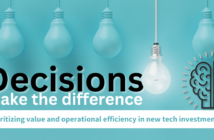by Zohreen Ismail
Hotel operators and owners often directly correlate investment with guest satisfaction. Increasingly, hotel operators are turning to analytics and data solutions as a guide. No two guests are alike, so data analytics is helping identify customer patterns and manage rooms analyzing whether each room is taking advantage of the optimal price.
“In hospitality, the focus should be on past, internal, external, and future data, asking yourselves these questions: How many room nights does each channel book on average?” said Sean Fitzpatrick, CEO of OTA Insight. “Where are your visitors coming from? Is there a difference in room type preference between your guest types? How far in advance do your guests book via each channel? And what is the average cancellation per segment? These are just a few examples, but they’re important questions, as the answers will dictate your pricing strategy.”
Data analytics has entered the hospitality space and is making a difference in two major ways. Every company has a large amount of data, but it’s what you do with that data that will make a difference and give you the tools to make educated decisions about where to invest. The first way data is affecting the hospitality industry is guest experience. The guest experience begins at the time of booking and continues until after the guest leaves your hotel. Data analytics allow hotels to target customers and personalize offers to potential guests, and they can show an operator when the service doesn’t meet the expectations of a guest and suggest ways to improve it.
The second way data affects the hospitality industry is through an operating aspect. Hotel owners and operators can use data to manage revenue solutions and assist in making distribution decisions. By leveraging actionable data, operators can craft distribution strategies while considering factors that affect distribution, such as inventory and specific customer demographics. Managers can use analytics when setting room rates. Figuring out what factors affect demand and what pricing strategies to use in different circumstances can potentially increase your bottom line.
“With clear, concise analytics and year-over-year comparison of revenue management KPIs – such as room nights, ADR, occupancy and revenue – you can really make a difference in your planning and implementation,” Fitzpatrick said. “When operators know what drives guest behavior, they can make business-intelligent decisions regarding all aspects of the hotel’s operation.”
Driving revenue and making smarter investment decisions applies to owners and operators of all-sized hotels. A small boutique hotel may have different needs than a large brand hotel property. One challenge boutique hotels face is reaching customers at the booking stage. Data analytics can assist with tracking how guests are finding your website and keywords used in search engines.
Hospitality industry professionals now have access to more data than ever before, resulting in smarter investment decisions. “If the data is provided in a format that is readable and easy to analyze at one glance, then you know you have made hotel operators’ lives easier, providing them with more time to work on strategy that will impact more on their revenue than collecting data,” Fitzpatrick said. “Hotel owners and operators need to know how to make the data work for their benefit and, ultimately, be able to offer a flawless guest experience.”




